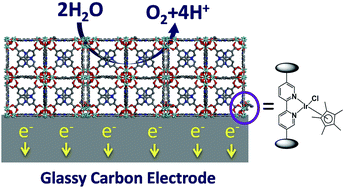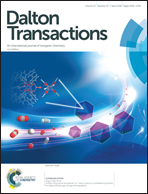Engineering iridium-based metal organic frameworks towards electrocatalytic water oxidation†
Abstract
Intensive efforts have been made towards designing water oxidation catalysts using homogeneous metal complexes. However, poor stability, caused by structure collapse and strong oxidants, prohibits further application of these catalysts. Therefore, the fabrication of stable and efficient water oxidation catalysts with robust structures and mild driving forces is in high demand. In this paper, we demonstrate the heterogeneous, porous and stable structure of Ir-doped metal organic frameworks (MOFs) by functionalizing bipyridine-incorporated MOFs with [IrCp*Cl(μ-Cl)]2 complexes. The resultant Ir-doped MOFs were immobilized on the surface of a glassy carbon electrode to drive the water oxidation process directly by electricity. Through the condition optimization, the enhanced electrocatalytic activity with an onset potential of 0.87 V versus the normal hydrogen electrode (NHE) towards oxygen evolution reaction with the highest Faradaic efficiency of 99% could be obtained. Moreover, it maintains high activity with no apparent loss for at least 3600 s. The excellent electrochemical performance may be ascribed to the unique MOFs structure, which not only protects the molecular catalyst from collapse, but also facilitates uniform distribution of active sites and efficient electron transfer through the channel.



 Please wait while we load your content...
Please wait while we load your content...